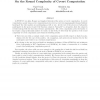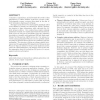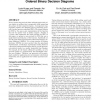150 search results - page 16 / 30 » Fair Secure Two-Party Computation |
STOC
2010
ACM
14 years 10 days ago
2010
ACM
In STOC’05, von Ahn, Hopper and Langford introduced the notion of covert computation. In covert computation, a party runs a secure computation protocol over a covert (or stegano...
CCS
2000
ACM
13 years 11 months ago
2000
ACM
The Internet provides an environment where two parties, who are virtually strangers to each other, can make connections and do business together. Before any actual business starts...
IACR
2011
12 years 7 months ago
2011
Companies, organizations, and individuals often wish to share information to realize valuable social and economic goals. Unfortunately, privacy concerns often stand in the way of ...
CCS
2006
ACM
13 years 11 months ago
2006
ACM
Privacy-preserving protocols allow multiple parties with private inputs to perform joint computation while preserving the privacy of their respective inputs. An important cryptogr...
PKC
2007
Springer
14 years 1 months ago
2007
Springer
Abstract. Yao’s classical millionaires’ problem is about securely determining whether x > y, given two input values x, y, which are held as private inputs by two parties, re...



